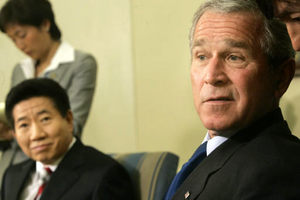Posted on : Sep.19,2006 20:11 KST
Modified on : Sep.20,2006 15:18 KST
 |
|
Korean President Roh Moo-hyun and U.S. President George W. Bush hold a joint press conference just before their summit meeting on September 15.
|
The United States is looking at various sanction options on North Korea, including reinstatement of measures withdrawn after conciliatory agreements with the Pyongyang regime, a State Department official said Monday.
As part of a renewed approach intended to bring Pyongyang back to nuclear disarmament negotiations, the U.S. is also considering bilateral contact with North Korea and some kind of action on a bank sanctioned for shady ties with the communist country, he said.
In a background briefing not for attribution, the official said internal deliberations are still ongoing on North Korea sanctions, including reinstatement of measures lifted in 1995.
"That is clearly one of the options we are looking at," he said.
His comments run counter to those by a senior diplomatic source, who said South Korea is against sanctions that might damage chances of reviving the six-party talks.
The source, also declining to be named, said Seoul had expressed to Washington its opposition, and the U.S. apparently decided not to take any actions before South Korean President Roh Moo-hyun's U.S. visit last week.
The U.S. removed some of the sanctions in 1995, a year after North Korea agreed to freeze its nuclear activities. More were lifted in 2000 when North Korea agreed to a missile moratorium.
But sanctions have resurfaced following Pyongyang's barrage of missile tests in July, after which the U.N. Security Council unanimously adopted a resolution condemning North Korea's actions and urging U.N. members not to transfer funds or material Pyongyang may funnel to its missiles and weapons of mass destruction programs.
"One of the possibilities is to go back to the pre-1994 package," the State Department official said.
The lifted sanctions in 1995 include unfreezing of North Korea-related assets at U.S. banks and restoring imports of North Korean magnesite.
Roh and U.S. President George W. Bush, meeting at the White House last week, reaffirmed their commitment to the six-party talks, a forum involving South and North Korea, the U.S., China, Russia and Japan.
The talks have stalemated since November due to Pyongyang's boycott.
The North demands that the U.S. first lift the sanctions imposed on Macau's Banco Delta Asia (BDA) a year ago after it was accused of laundering money for Pyongyang. Washington says the measures are strictly law enforcement issues and should not be linked to the six-party talks.
Seoul officials said after the summit that the two presidents agreed to pursue a "common and comprehensive" approach to prod Pyongyang back to dialogue.
One of the key elements to the approach is that Christopher Hill, chief U.S. delegate to the talks, would have bilateral contacts with his North Korean counterpart, the official said, emphasizing at the same time that they would be done "in the context of the six-party talks."
"The other element I believe has to do with a movement on the BDA case," he said.
"That's a bit more difficult."
North Korea claims that some of its funds at BDA are legitimately earned proceeds that should be freed from frozen assets. Treasury officials have repeatedly said the line between legitimate and illegitimate transactions is getting murkier as the investigation continues. They also have refused to say when their probe would be concluded.
The State Department official reiterated that the BDA case has to do with law enforcement.
"We have no intention to interfere" with the investigation, he said.
Washington, Sept. 18 (Yonhap News)



